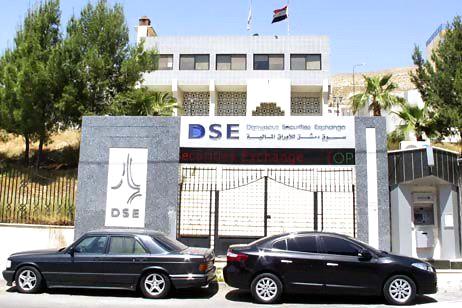Ammon News - DUBAI (The National) - Syria's bourse has become a haven for investors to hedge against the world's worst performing currency.
Shares listed on the Damascus Securities Exchange have risen by as much as 50 per cent this year, after the index touched a low of 768.37 points on January 7.
"The Syrian citizen is born a trader, he can identify opportunities that arise," said Mamoun Hamdan, the newly appointed chief executive of the DSE after the bourse's former boss and finance minister Mohammad Al Jalililati resigned in February. "For many, it was like an arbitrage opportunity, as stocks were seen as oversold and the pound weakened from a low to a new low against the US dollar and euro," Mr Hamdan said.
The bourse nosedived from its high of 1,752.50 points in December 2010, when the Arab Spring uprisings contagion began in Tunisia and Egypt, and made their way towards Damascus.
The in the Syrian pound, the world's steepest currency decline this year, has prompted Syrians to look for alternative methods to maintain the value of their assets amid restrictions on foreign currency and remittances abroad. The pound has fallen 31.9 per cent against the dollar this year, touching a low of 130 pounds to the dollar in April, compared to 47 pounds before the war.
There are 20 stocks listed on the DSE, 12 of which are banks, with the rest from the insurance, services, industrial and agriculture sectors.
"A lot of wealthy investors, retails, knew how to play the game," said Hasan Sirafi, the head of finance at Cham Capital, part of Cham Holdings that was added to aEuropean Union sanctions list of companies and individuals in 2011. "At the start of the crisis, they converted all their local currency to dollar, and then converted it back to the pound when it really lost its value and then put it into the stock market. By then, many of the shares had dropped to below their book value."
Traded volume and values last month rose to a high of 1.83 million shares traded, or 236.08 million Syrian pounds (Dh8.42m) worth. That compares with a low of 340,805 shares traded, or 78.3m pounds last year.
Another cause for reignited interest on the DSE is that people have become accustomed and adapted to the crisis, Mr Sirafi said.
The bourse's chief executive confirmed Mr Sirafi's view. "There are plenty of people who had cash stashed on the side waiting to see how the crisis develops. The bourse continued to operate despite the crisis. It gave the confidence to the participants that they shouldn't have to worry about buying or selling their shares at a specific time," said Mr Hamdan.
Late last year, the stock market started buying batteries, computers and other essential portable infrastructure equipment in an attempt to ensure trading will continue in the event of a large-scale emergency.
It advertised a tender to buy batteries, in an effort to ensure that generators are still able to provide power in the event of an extended electricity blackout.
